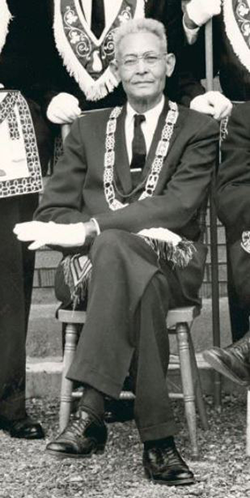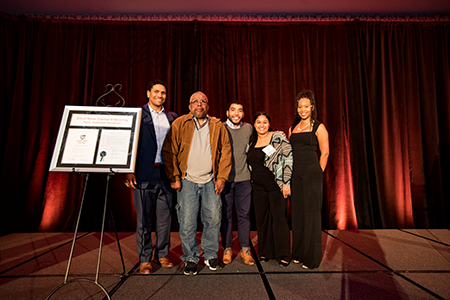Today we celebrate Juneteenth. The day commemorates the emancipation of enslaved African-Americans, reflecting the date of June 19, 1865, when enslaved people in Texas, the last state of the confederacy with slavery, were freed. Since that time, celebrations have grown from small community church gatherings to large festivals in every state across the country.
Juneteenth reflects liberation, defined as the act of setting someone free from imprisonment, slavery, or oppression. While it is an important date in our history to celebrate, we at the City of Roses Disposal & Recycling (COR) believe our work is not done until we are all truly liberated, which will not come until everyone is treated as equal.
To solve the many problems in our world, from the environment to poverty, our focus must be on our most important asset, human capital. Until every person has a roof over their head, equal access to educational opportunities, and better mental health care, our problems will persist. We don’t have a trash problem in Portland, we have people who have no option but to live on the street with nowhere to put their waste but where they sit. We don’t have a graduation rate problem, we have kids who are being left behind because they lack access to today’s technology. We don’t have a crime problem, we have a disenfranchised population, a seemingly insurmountable wealth gap, and a mental health crisis. The solutions are not to put money towards studies and hired experts, but to put money and efforts towards giving every citizen a fair shot and erasing what has become a cycle of poverty—liberating all. This is what we believe.
A History of Service
 We don’t come to the recognition of this bigger picture suddenly. As part of our Juneteenth celebration, we reflect on the history of our family and our business, which has long roots in putting community first. Our great grandfather, Robert Bird was a Freemason who played a significant role in the formation of the Prince Hall Masonic Lodge in Portland back in the early 1900s, eventually becoming the organization’s treasurer. The lodge was named for Prince Hall, a former slave from Barbados, who established the first Black Masonic order in the United States. He used his platform to call attention to Africans who remained enslaved, while also playing a significant role in developing Black leadership, unity, and camaraderie, embracing the concepts of building both self-esteem and self-discipline.
We don’t come to the recognition of this bigger picture suddenly. As part of our Juneteenth celebration, we reflect on the history of our family and our business, which has long roots in putting community first. Our great grandfather, Robert Bird was a Freemason who played a significant role in the formation of the Prince Hall Masonic Lodge in Portland back in the early 1900s, eventually becoming the organization’s treasurer. The lodge was named for Prince Hall, a former slave from Barbados, who established the first Black Masonic order in the United States. He used his platform to call attention to Africans who remained enslaved, while also playing a significant role in developing Black leadership, unity, and camaraderie, embracing the concepts of building both self-esteem and self-discipline.
Under the early leadership of Robert Bird, and many others, the national order of Prince Hall Masons grew to what it is today, the oldest and largest group of Masons of African origin in the world, with forty Grand Lodges of Prince Hall Freemasonry in the United States, Canada, the Bahamas, and Liberia. The Prince Hall Grand Lodge has spent more than 125 years working on the causes of social activism and community improvement, and they continue to offer relief, services, and educational donations to distressed citizens.
The Portland chapter embraced these causes and by the 1980s had added to its focus by working to improve race relations between the police and African American communities, foster crime prevention, aid crime victims, and expand its scholarship programs. It also widened its membership from predominantly African Americans to Asian and white people as well as those of Jewish and Muslim beliefs.
Where We Are Today
Building on that family history, COR founder Al Simpson took a chance in 1996 by purchasing, with funds from a second mortgage on his home, a roll-off waste truck, and started his own sustainable waste company. With just one other black-owned waste company in Portland at the time, Al thought it was time to increase the diversity in the industry and he made it his mission to not just grow the business but to provide people of color careers with real economic advancement opportunities.
 Today COR is the only privately held transfer station in the City of Portland and the only such business in the U.S. that is owned and operated by African Americans. Our business includes our Portland-based Transfer Station/Material Recovery Facility, our solid waste collection services, and demolition and deconstruction services that offer alternative and sustainable ways of removing structures.
Today COR is the only privately held transfer station in the City of Portland and the only such business in the U.S. that is owned and operated by African Americans. Our business includes our Portland-based Transfer Station/Material Recovery Facility, our solid waste collection services, and demolition and deconstruction services that offer alternative and sustainable ways of removing structures.
Reflecting on our history and our own values of today, we are also a Certified B Corporation meaning we meet the highest standards of social and environmental performance, public transparency, and legal accountability. Our profit is balanced with our purpose to help redefine success in business and build a more inclusive and sustainable economy.
Yes, Juneteenth is a day to celebrate and we celebrate it as a day of liberation, but we know Juneteenth was just a start. At COR, we will continue to work hard every day to ensure we will all one day be liberated and every aspect of our lives and our planet will flourish.